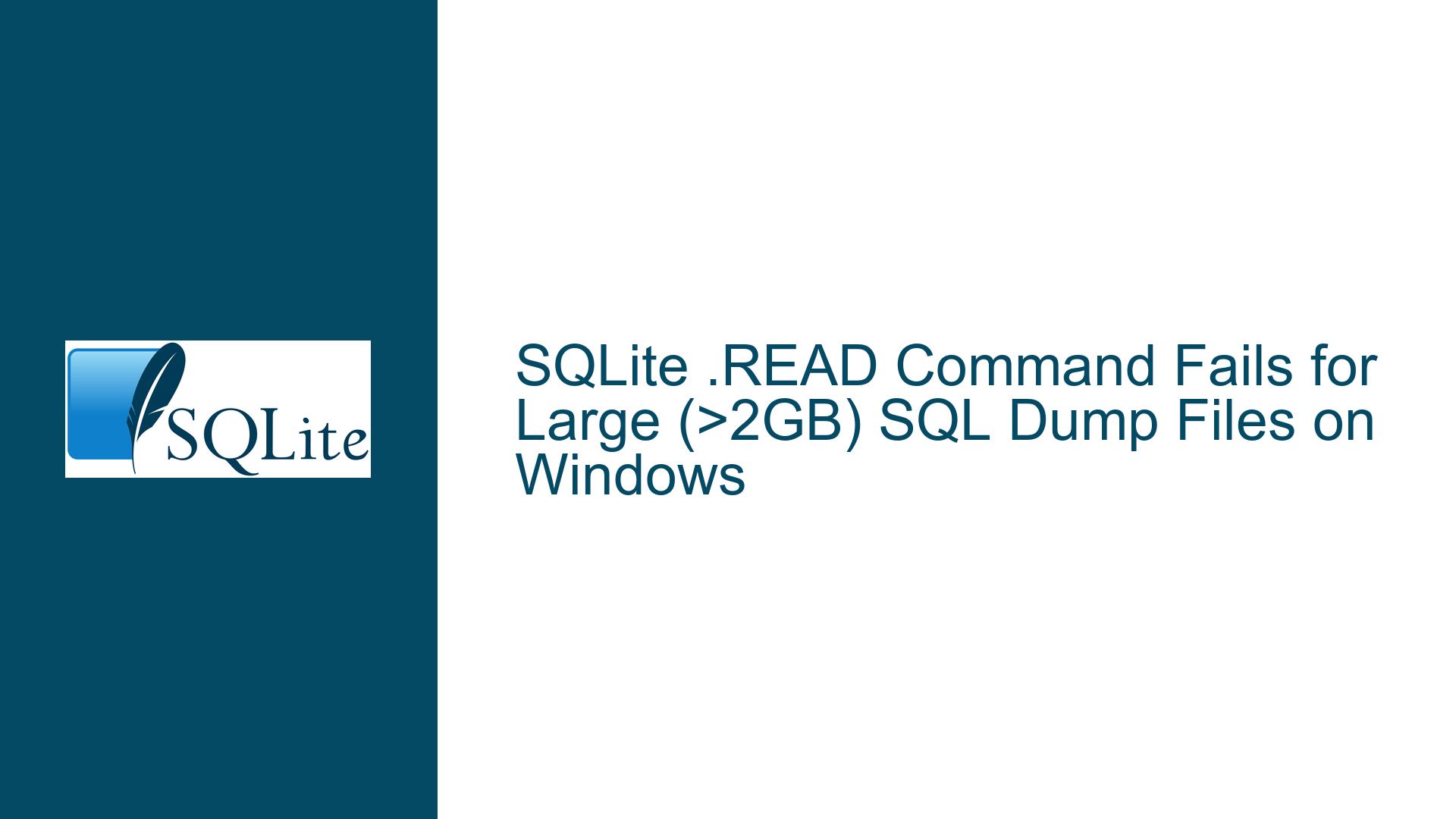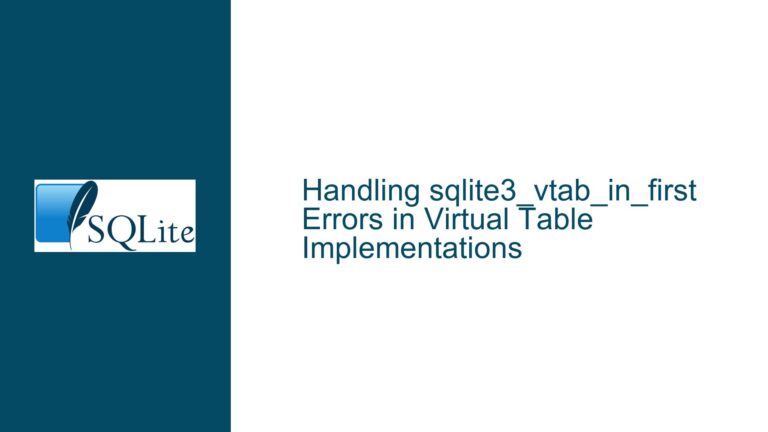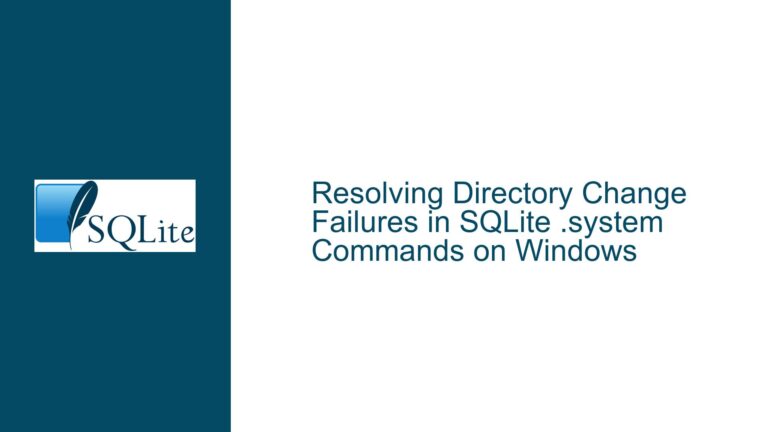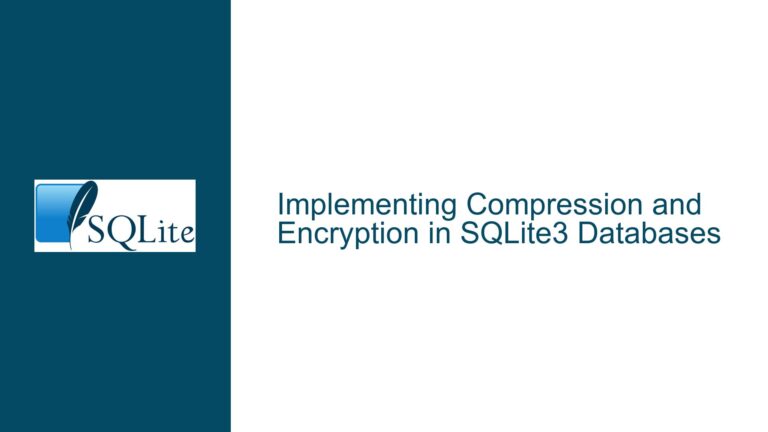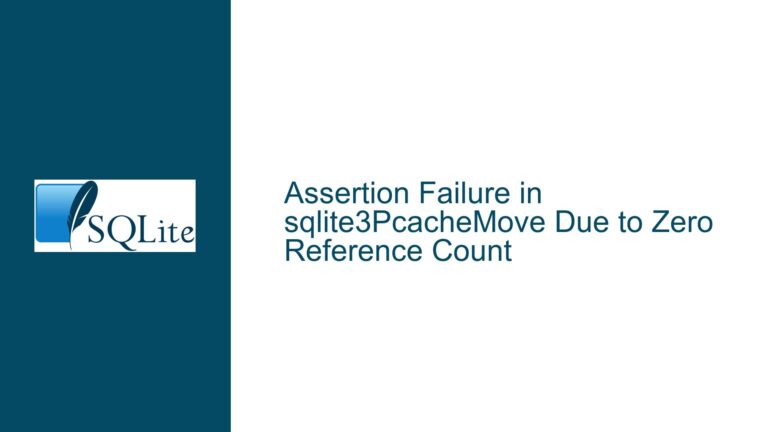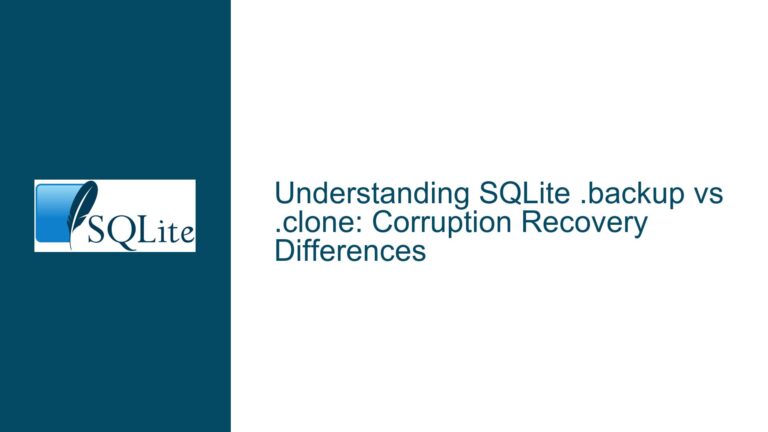SQLite .READ Command Fails for Large (>2GB) SQL Dump Files on Windows
Issue Overview: 2GB File Size Limit When Importing SQL Dumps via .READ
The core problem involves SQLite’s command-line interface (CLI) failing to process SQL dump files larger than 2GB when using the .read command on Windows systems. Users report the error "Error: cannot open ‘dumpfile.sql’" when attempting to import these large files, despite successful operations with smaller dumps. This issue arises specifically when restoring databases from SQL scripts generated by the .dump command. The failure occurs exclusively in Windows environments, even when using 64-bit builds of SQLite, and is tied to internal file handling mechanisms within the SQLite shell.
Key technical observations include:
- The SQLite shell’s
openChrSource()function (in shell.c) uses Windows file system APIs that impose a 2GB limit due to reliance on 32-bit file size handling. - Error 132 ("value too large") manifests when
_fstat()interacts with files exceeding 2GB, caused by overflow in thest_sizemember of thestruct _statdata structure. - Input redirection via
<operator works around the problem, as it bypasses the shell’s file size checks entirely.
This behavior stems from a mismatch between 64-bit file system capabilities and legacy 32-bit API usage in SQLite’s Windows implementation. The issue persists across multiple SQLite versions (including 3.39.2 and prerelease 3.45.0) unless specifically patched.
Possible Causes: 32-Bit File Stat APIs in 64-Bit SQLite Builds
1. Incorrect File Size Detection via _fstat() and _stat()
The SQLite shell uses the Windows _fstat() function to verify whether a file is a regular file, character device, or pipe before reading it. The struct _stat employed by these functions contains a 32-bit st_size field, which cannot represent file sizes exceeding 2^31-1 bytes (2,147,483,647 bytes). When applied to files larger than 2GB, this causes integer overflow and triggers an "invalid argument" error (errno 132), despite the host system being fully 64-bit capable.
2. Compilation with Legacy Windows CRT APIs
Even when compiled for x64 architectures, SQLite’s Windows shell may link against older versions of the Microsoft C Runtime (CRT) library that default to 32-bit file operations. The _fstat() and _stat() functions belong to this legacy category, unlike their 64-bit-aware counterparts _fstat64() and _stat64(), which use the struct __stat64 with a 64-bit st_size member.
3. Shell Code Path Differences Between .READ and Input Redirection
The .read command performs explicit file validation through openChrSource(), while input redirection (via <) directly attaches the file to standard input without size checks. This explains why sqlite3 newdb.db < dumpfile.sql succeeds where .read fails – the former never invokes the problematic _fstat() code path.
Troubleshooting Steps, Solutions & Fixes
Step 1: Verify SQLite Shell Architecture and File Handling Capabilities
Confirm you’re using a true 64-bit SQLite build:
sqlite3.exe :version
Check for "(64-bit)" in the output. If unavailable, download the 64-bit binary from SQLite’s download page or rebuild from source with x64 toolchains.
Deep Dive:
32-bit SQLite shells cannot handle >2GB files regardless of API usage due to address space limitations. However, 64-bit builds may still fail if using 32-bit file stat APIs, as seen here.
Step 2: Patch SQLite Shell to Use 64-Bit File Stat Functions
Modify shell.c in the SQLite source code as follows:
Original Code:
struct _stat x = {0};
/* ... */
if( _fstat(_fileno(rv), &x) != 0
|| !STAT_CHR_SRC(x.st_mode)){
Patched Code:
struct __stat64 x = {0};
/* ... */
if( _fstat64(_fileno(rv), &x) != 0
|| !STAT_CHR_SRC(x.st_mode)){
Rebuild Instructions:
- Download SQLite amalgamation source
- Apply the above changes to shell.c
- Compile with MSVC x64:
cl /nologo /MD /D_CRT_SECURE_NO_WARNINGS /DSQLITE_ENABLE_JSON1 /DSQLITE_ENABLE_FTS5 shell.c sqlite3.c /link /out:sqlite3.exe
Technical Rationale:
struct __stat64contains a 64-bitst_size(signed __int64)_fstat64()retrieves file attributes compatible with >2GB files_fileno()remains compatible as it returns an integer file descriptor
Step 3: Use Input Redirection as Temporary Workaround
While awaiting a patched build, import large dumps via:
sqlite3.exe newdb.db < dumpfile.sql
This bypasses the shell’s file validation routines entirely, leveraging the operating system’s native file handling through standard input.
Caveats:
- Does not work for multiple
.readcommands within interactive sessions - May require splitting dumps if combined with other commands
Step 4: Update to SQLite Versions with Official Fixes
The SQLite team addressed this in trunk post-version 3.45.0 (check timeline). Obtain fixed builds via:
- Nightly Snapshots: Download from SQLite snapshot page
- Custom Builds: Merge commit 929bcc4098549692 into your source tree
- Verify Fix: Ensure
shell.cuses_stat64/_fstat64inopenChrSource()
Step 5: Diagnose File System Limitations
Although rare on NTFS, confirm the filesystem allows >2GB files:
fsutil fsinfo volumeinfo C: | find "File System Name"
Expected output: NTFS. For FAT32/exFAT, 4GB+ files require sector size adjustments.
Step 6: Alternative Import Methods for Large Databases
When shell limitations persist, consider:
1. Direct Database-to-Database Transfers
sqlite3 source.db ".backup temp.db"
sqlite3 target.db ".restore temp.db"
2. Split Dump Files
Use split (Unix) or PowerShell:
Get-Content .\dumpfile.sql -ReadCount 100000 | %{$i=0}{$path="dump_part_$i.sql"; $_ | Out-File $path; $i++}
Import sequentially:
FOR %f IN (dump_part_*.sql) DO sqlite3 newdb.db ".read %f"
3. Use Third-Party Tools
- DB Browser for SQLite: Implements custom file handling
- sqlite3_analyzer: Handles large files better in some configurations
Step 7: Monitor Windows CRT Library Behavior
Debug file stat operations using:
A. Custom Wrapper DLL
Interpose _fstat64() calls via DLL injection:
// fstat64_wrapper.c
#include <sys/stat.h>
int __cdecl _fstat64(int fd, struct __stat64 *buf) {
return __fstat64(fd, buf);
}
Compile with:
cl /LD fstat64_wrapper.c /link /export:_fstat64
Run with:
set PATH=.;%PATH%
sqlite3.exe newdb.db ".read dumpfile.sql"
B. Process Monitor Tracing
Capture file system calls using Sysinternals ProcMon:
- Filter
Process Name=sqlite3.exe - Check
Resultcolumn forINVALID_PARAMETERentries - Inspect stack traces for CRT library calls
Step 8: Recompile SQLite with Large File Support Flags
While primarily a Unix concern, Windows builds benefit from:
#define _FILE_OFFSET_BITS 64
#define _LARGEFILE_SOURCE 1
#define _LARGEFILE64_SOURCE 1
Add these to sqlite3.c and shell.c before any includes.
Step 9: Validate Patch Effectiveness
After applying fixes, test with:
A. Synthetic 2GB+ File Test
# Generate 2.1GB test file
fsutil file createnew test.sql 2100000000
sqlite3 test.db ".read test.sql"
B. Error Message Verification
Successful reads return no output. Failed attempts show:
Error: cannot open "test.sql"
Error: cannot open "test.sql"
C. Debug Build Diagnostics
Compile SQLite with -DSQLITE_DEBUG=1 and trace file operations:
sqlite3_test.exe newdb.db ".read dumpfile.sql" 2> debug.log
Search debug.log for _fstat64 invocations.
Step 10: File Bug Reports with Diagnostic Data
When encountering unresolved issues, submit to SQLite Forum with:
- SQLite version (
sqlite3 -version) - Compiler version (
cl /Bvfor MSVC) - Windows build info (
winver) - Relevant
_stat64/_fstat64declarations fromsys/stat.h - Preprocessed shell.c excerpts showing
openChrSource()
Final Recommendations
For production environments handling >2GB SQLite databases:
- Official Fixes: Prioritize SQLite 3.45.0+ with confirmed
_stat64usage - Input Redirection: Standardize on
<operator for large imports - Custom Builds: Maintain patched SQLite shells for Windows deployments
- Monitoring: Implement file size alerts approaching 2GB thresholds
The interplay between Windows CRT APIs and SQLite’s file validation logic creates this edge case. While the core database engine supports terabyte-scale databases, the shell’s file handling required targeted fixes to maintain compatibility with modern large-file workflows.
